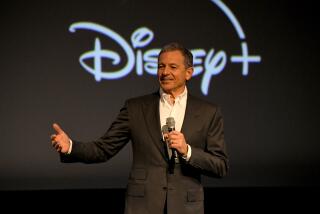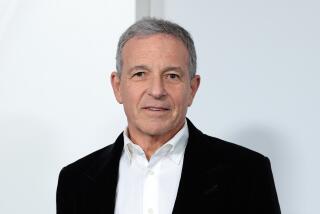Getting to the Bottom of Michael Eisner’s $565-Million Payday
- Share via
Heigh-Ho! Heigh-Ho! It’s off to the bank Michael Eisner goes.
Wednesday was a watershed event for American business compensation, as well as in the corporate life of Eisner, Walt Disney Co. chairman and chief executive. Eisner exercised a record 7.3 million stock options, giving him a one-day, pretax payday of about $565 million.
Here are some basic questions about what Eisner did and why:
Q: Why did it happen now?
Eisner had to act fairly soon. The options Eisner exercised expired Jan. 11, 1999. After that, they would have become worthless.
*
Q: Why didn’t he wait until just before they expire?
Eisner has told people it was because he felt he had a rare window of opportunity in which the company is experiencing relative calm. That’s important, because as chief executive of a major publicly held company, Eisner is privy to “inside” developments about Disney’s business that other shareholders don’t know about yet.
Were a major financial bombshell lurking that would trigger a stock sell-off, Eisner and Disney could be sued by shareholders claiming that he acted based on secret information.
*
Q: Why is the payday so high?
Eisner’s employment agreement, signed in 1989, allowed him to buy stock at less than one-fifth of the price that it is trading at now.
*
Q: How do I get something like that?
You don’t. In 1989, when Eisner agreed to stay on as Disney’s CEO, company directors gave him the right to buy 8 million shares at what could be a great price, because they wanted to keep him.
That gave Eisner a big financial incentive to boost Disney’s stock price. Had that not happened, the options would be worthless and he would be stuck having to get by on his $750,000 annual salary.
Earlier this year, when he agreed to stay at Disney through Sept. 30, 2006, Eisner got options for an additional 8 million shares that he can’t exercise yet. If the stock continues to go up, he will have another jackpot in a few years. Eisner still has options for 700,000 shares from his 1989 deal that have not been exercised.
*
Q: How did he exercise his options?
Eisner on Wednesday acquired 5.5 million shares of stock at the bargain basement price of $17.14 a share. He acquired 1.8 million more shares at $19.64 each.
Based on the price of Disney’s stock on Wednesday, he reaped in a single day a pretax gain of about $565 million.
On Thursday, Disney ended at $93.56 a share, down $1.63 on the New York Stock Exchange.
*
Q: Why has the stock done so well?
Since 1989, the company has been highly profitable and has also experienced exceptional growth.
Although Disney is facing some problems, including softness in ABC’s prime-time schedule and feature animation films that haven’t performed as well as hoped, most analysts remain bullish on its long-term outlook.
Disney and Eisner also have benefited from the bull market.
*
Q: Is Eisner a buyer or a seller?
Both. He is adding 1.6 million shares to his holdings, bringing it to 3.6 million shares, but he sold nearly 80% of the shares he acquired Wednesday and is giving 300,000 shares to charity.
*
Q: Does selling shares show a lack of faith in the company?
Not likely. The major reason he sold shares was to raise money to cover taxes and to pay for the shares.
Like the rest of us, Eisner can’t go down to his ATM and withdraw the $130 million he needed to buy the stock or to cover the $240 million in taxes he owes on the deal. It’s common for executives exercising options to sell some of their stock to cover such costs.
But some executive compensation experts, among them author Graef Crystal, believe that top executives were spooked by the market plunge in October and expect many to exercise options and sell some of their shares.
Eisner sold about 1.4 million shares for “estate planning purposes.” That’s often a euphemism for diversifying one’s portfolio.
*
Q: Will he get grief about this?
Executive compensation experts say Eisner’s contract is tied to performance more than the contracts of many other executives. What’s more, he enjoys strong support from Disney’s board of directors and major shareholders, who believe he’s worth it.
Still, Disney is a lightening rod for criticism, and it’s a safe bet shareholder activists will speak up at the next annual meeting.
More to Read
Inside the business of entertainment
The Wide Shot brings you news, analysis and insights on everything from streaming wars to production — and what it all means for the future.
You may occasionally receive promotional content from the Los Angeles Times.










